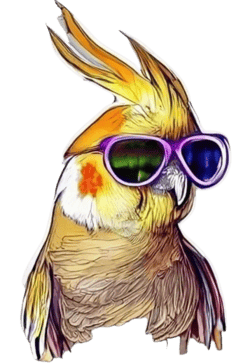Winter Warriors: How Well Can a Cockatiel Survive in Cold Weather?
Winters can be a magical time, with its pristine snow blankets and the serene silence of cold nights. However, for pet owners, especially those with exotic birds like cockatiels, it raises a pertinent question: How well can these feathered friends adapt to the chill? In this piece, we’ll unravel the mystery of cockatiels and their cold weather resilience, offering insights, tips, and anecdotes to ensure your pet remains happy and healthy throughout the frosty season.
Understanding Cockatiel Cold Tolerance
Cockatiels hail from the Australian outbacks, areas known for their dramatic temperature swings. This origin gifts cockatiels a surprising level of adaptability to temperature variations, but how does this play out in domestic settings far from their natural habitat?
The Biology of Adaptation
- Thermoregulation: Cockatiels, like most birds, are adept at regulating their body temperature. They fluff up their feathers to trap heat, a natural cozy jacket!
Environmental Thresholds
- Safe Temperature Range: Cockatiels are most comfortable in temperatures between 65 to 80°F (18 to 27°C). Below 40°F (4°C), the risk of hypothermia increases significantly.
Keeping Your Cockatiel Warm and Snug
Now that we’ve established the need for warmth, how can pet owners ensure their cockatiels sail through winter without a shiver? Here’s a detailed guide.
Indoor Comfort
- Maintain a Steady Temperature: Utilize heating sources to keep the bird’s environment within their comfort range. Be wary of direct hot air which can be harmful.
- Humidity Matters: Winter heating can dry out the air, affecting your bird’s respiratory system. Aim to maintain a healthy humidity level in their living space.
Winterizing the Cage
- Cozy Additions: Add extra blankets or covers over the cage at night to provide additional warmth. Ensure there’s still adequate ventilation.
- Location, Location, Location: Position the cage in a draft-free area away from windows but ensure it still receives some daylight.
Diet and Hydration
- Boost Their Diet: Winter can increase caloric demand; consider incorporating foods high in calories and vitamin A to support their energy and immunity.
- Water is Key: Ensure their water doesn’t freeze. A lukewarm water offering might be appreciated on colder days.
Monitoring Health: Signs to Watch For
Despite our best efforts, cockatiels can still feel the cold. Be on the lookout for signs of distress or cold exposure such as lethargy, ruffled feathers, and decreased vocalization. Early detection can prevent serious complications.
Personal Touch: A Tale of a Toasty Tielaide
I remember the first winter with my cockatiel, Adelaide. I noticed her becoming less active and more fluffed up. Taking swift action, I adjusted the temperature, added extra bedding, and enhanced her diet. The transformation was immediate – her chirps filled the warmth-bathed room once again, a testament to the difference a bit of care can make.
Conclusion: A Warm Winter for Winged Companions
As we’ve explored, with the right knowledge and preparation, cockatiels can not only survive but thrive in colder climates. It’s a delicate balance of providing warmth, ensuring a nutritious diet, and being vigilant for signs of discomfort. Remember, the warmth you offer goes beyond physical temperature; it’s the warmth of care and love that truly makes a difference in your feathered friend’s life.
Key Takeaway: Winter doesn’t have to be a daunting time for cockatiel owners. With attentive care, our feathered friends can enjoy the season in comfort and health, mirroring the warmth of their human companions.
While every effort has been made to ensure the accuracy and reliability of the information provided in this blog post, pet health concerns should always be discussed with a veterinarian, especially when adapting to seasonal changes.

About Me
I’m Kamran, a co-founder and content creator at cockatielhq.com. With 8+ years in the world of avian enthusiasts, I’ve gained extensive knowledge in caring for birds. From egg-laying and mating to cohabitation with other birds, dietary needs, nurturing, and breeding, I’m here at cockatielhq.com to share valuable insights for your avian companions.








One Comment